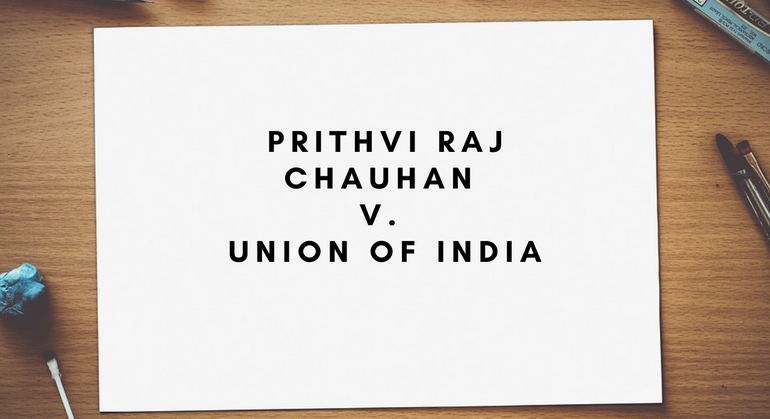

Prithvi Raj Chauhan v. Union of India
In this case, the constitutional validity of section 18-A of the Scheduled Tribes and Scheduled Castes (Prevention of Atrocities) Amendment Act,2018 was challenged by the petitioners. The petition was filed on the basis that section 18-A of the said Act nullifies the decision of Subhash Kashinath Mahajan v. The State of Maharashtra &anr. Where the court held that the provisions of the Prevention of Atrocities Act were misused. The court had introduced various safeguards in the Kashinath Mahajan case but the parliament overturned these safeguards by the amendment in the Act. The safeguards given in this case were-
- Conduct preliminary inquiry before registration of First Information Report.
- Investigating officers should receive approval before the arrest.
- Anticipatory bail to accused, notwithstanding any judgment or order or direction of any court.
This amendment has diluted the effect of Kashinath Mahajan The intention of Kashinath Mahajan Judgement was to prevent the people from abusing the Act. After the passing of Kashinath Mahajan, the parliament took a step to undo the judgment as it causes so much violence and protest by the Adivasis and Dalits group and placed the amendment bill in the parliament.
A review petition challenging the Kashinath Mahajan judgment was filed before the Apex Court of India. The legislature even has not waited for the court to hear the review petition filed which challenging the judgment. The Apex court issued a notice on 7th September 2018 to the central government to submit its response to the petition. In response to the notice, the central government file affidavit and stated that-
The legislature is competent to make changes through the process of A large number of acquittal cases under the Scheduled Caste and Scheduled Tribe (Prevention of Atrocities Act) do not indicate the cases to be fake.
Various petitions were filed challenging the 2018 Amendment. On 13th September 2019, the review petition was referred by a division bench comprising Arun Mishra and UU Lalit to the three-judge bench. After hearing before the three-judge bench, the court upheld the constitutional validity of the 2018 Amendment.
The section 18-A of the Act states that-
- For the purposes of this Act, —
- the preliminary inquiry shall not be required for registration of a First Information Report against any person; or
- the investigating officer shall not require approval for the arrest, if necessary, of any person, against whom an accusation of having committed an offense under this Act has been made and no procedure other than that provided under this Act or the Code shall apply.
- The provisions of section 438 of the Code shall not apply to a case under this Act, notwithstanding any judgment or order or direction of any Court.”. This section has been inserted by the Amendment of 2018 to nullify the preliminary inquiry before the registration of First Information Report (FIR), with no requirement of approval by the investigating officer before the arrest. The section further states that no anticipatory bail will be given for the offense under the Act.
Issues
The issues in the present case are as under :
- Whether section 18–A of the Scheduled Caste and Scheduled Tribe (Prevention of Atrocities) Amendment Act, 2018 is constitutionally valid?
- Whether bar on granting anticipatory bail is valid and whether it infringes the personal liberty of a person under Article 21 of the Constitution.
Judgment
In the present case, the three-judge bench of the Apex Court of India has upheld the Constitutional validity of section 18-A of “The Scheduled Caste and Scheduled Tribes (Prevention of Atrocities) Amendment Act,2018” and had nullified the effect of the Kashinath Mahajan case. The court held that the directions given in the Kashinath Mahajan case had placed an unnecessary burden upon people of Scheduled Tribes and Scheduled Castes. While dealing with the section 18-A of the Act, the court said that while looking into the provision of section 18 with respect to the preliminary inquiry before registration of First Information Report (FIR), the inquiry is permissible only in conditions laid down in Lalita Kumari v. Government of U.P.
The Court further held that no anticipatory bail to be given for offenses under the Scheduled Tribes and Scheduled Castes Amendment Act. In the concurring view, Justice Ravindra Bhat observed that anticipatory bail can only be given in exceptional cases and not in every case. The court had earlier observed that the anticipatory bail can only be granted where there is no prima facie case under the Scheduled Tribes and Scheduled Castes Act. Justice Ravindra Bhat while delivering judgment also stated about equal treatment of all citizens and fostering the idea of fraternity because the concept of fraternity is as of vital importance as the personal liberty of a person.
The Court further held that if an accused is a public servant, the arrest can be made only after the approval of appointing authority and if the accused is a non-public servant, the arrest can be made after the permission of the Senior Superintendent of Police.



